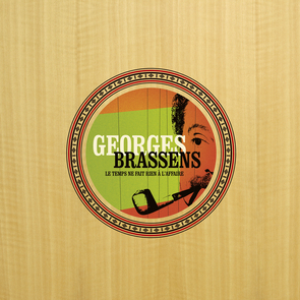
He was uncompromising when composing his songs. His tactical method of addressing issues was profound and often humorous, making him a unique and effective figure in the French community.
Brassens, born in 1921 in the small Mediterrenean port of Sete, wanted to be a poet. He realized very early however that poetry in the 20th century could hardly put bread on the table and instead set himself to become a singer.
He is much less famous internationally than contemporaries like Charles Aznavour, Edith Piaf and Yves Montand, as much of the impact of his songs came from the lyrics, which proved difficult to translate into other languages. He loved the Middle Ages and used a great deal of Old French vocabulary, as well as many classical - ie., Latin and Greek - references. Few people, even in France, possess the background to fully understand his songs.
Yet he was at the same time a hugely popular singer and many of his songs still carry a lot of appeal and relevance. In this sense, he can be compared to Boris Vian, to Jacques Brel, and to a lesser extent to Serge Gainsbourg.
He was very sophisticated, yet at the same time used profanity liberally. While he wasn't politically engaged, he was nevertheless unambiguously a leftist, many of his songs carrying blatant and buoyant anarchist overtones.
While his music was initially quite primitive, the 1950's St-Germain-des-Pres influence quickly made itself felt and while subdued and - in his mind - always secondary to the lyrics, it became increasingly sophisticated - to the point that many of his songs have been covered and reinterpretated by jazzmen (see for instance this UK site: www.projetbrassens.eclipse.co.uk)
He died in 1981, but up to this date (2006) there are few French people - including most of those born since - who can't sing along to his most famous song, Les Copains d'abord ("Friends foremost") or his "Bancs public" ("Public Benches").
For those interested, this site carries a number of (quite good) English tranlations of his songs: www.brassens.org
Sous le kiosque à musique
Georges Brassens Lyrics
Jump to: Overall Meaning ↴ Line by Line Meaning ↴
Par les beaux soirs d'été
Sous le kiosque à musique
On entend l'orphéon
Les tambours les clairons
La fanfare et la clique
Pas besoin de billet
Tous les chiens du quartier
Et dans tous les concerts
On joue Mozart ou Wagner
Où? Sous le kiosque en plein air
Avec un air timide
Le fils du percepteur
Joue de l'ophicleide
Il en est tout en sueur
Le notaire en personne
Ajustant son lorgnon
Prend son bigophone et son vieux trombone
Et joue l'air des lampions
Ce qu'on peut rigoler
Par les beaux soirs d'été
Sous le kiosque à musique
On entend l'orphéon
Les tambours les clairons
La fanfare et la clique
Pas besoin de billet
Pour entendre aboyer
Tous les chiens du quartier
Et dans tous les concerts
On joue Mozart ou Wagner
Où? Sous le kiosque en plein air
Où? Sous le kiosque en plein air
The song "Sous le kiosque à musique" by Georges Brassens is an ode to the joy and lightness of summer nights spent listening to music under the bandstand. The opening verse sets the tone for the rest of the song, highlighting the fun and laughter that can be had on warm summer evenings. The use of the term "orphéon" (a type of vocal group) in the second verse reinforces the sense of community and togetherness that comes with these musical gatherings. The third verse introduces the idea that anyone and everyone can join in, as there is no need for a ticket or formal invitation. The fourth verse describes the range of instruments played, from the humble ophicleide (a type of tuba) to the lorgnon (a type of magnifying glass) used by the notary. The final verse ends with a repetition of the chorus, emphasizing the simplicity and accessibility of this particular kind of music-making.
Overall, the song celebrates the joy and sense of community that comes from participating in this type of musical tradition. Brassens uses humor and lightness to convey the sense of fun and lightheartedness that comes with these gatherings. The use of specific instruments and musical terms, as well as the inclusion of a range of professions, serves to highlight the universal appeal of this type of music-making.
Line by Line Meaning
Ce qu'on peut rigoler
How much laughter can be had
Par les beaux soirs d'été
On beautiful summer evenings
Sous le kiosque à musique
Under the bandstand
On entend l'orphéon
You can hear the choral group
Les tambours les clairons
The drums and the trumpets
La fanfare et la clique
The brass band and group of musicians
Pas besoin de billet
No need for tickets
Pour entendre aboyer
To hear all the barking
Tous les chiens du quartier
All the neighborhood dogs
Et dans tous les concerts
And in all the concerts
On joue Mozart ou Wagner
They play Mozart or Wagner
Où? Sous le kiosque en plein air
Where? Under the open-air bandstand
Avec un air timide
With a shy air
Le fils du percepteur
The tax collector's son
Joue de l'ophicleide
Plays the ophicleide
Il en est tout en sueur
He's all sweaty from it
Le notaire en personne
The notary himself
Ajustant son lorgnon
Adjusting his pince-nez
Prend son bigophone et son vieux trombone
Takes his cornet and his old trombone
Et joue l'air des lampions
And plays the tune of the lanterns
Lyrics © Warner Chappell Music, Inc.
Written by: Charles Andre Cachant, Jean Alcide Marie Marcland, Maurice Antoine Vanderhaeghen
Lyrics Licensed & Provided by LyricFind